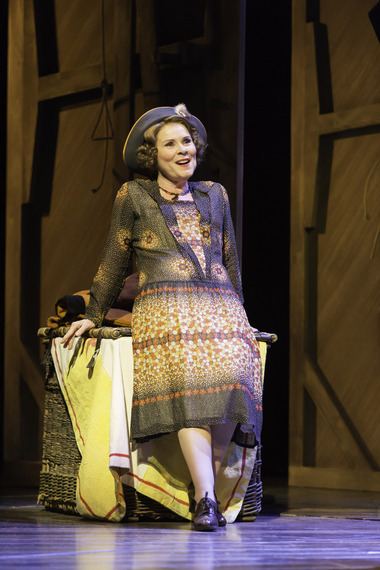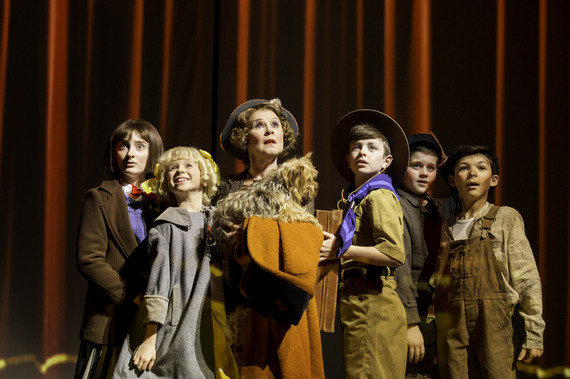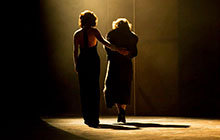 Imelda Staunton in Gypsy. Photo: Johan Persson
Imelda Staunton in Gypsy. Photo: Johan Persson
Ethel Merman. Angela Lansbury. Bernadette Peters. Patti LuPone. Imelda Staunton.
One name, pretty clearly, doesn't belong on that list of larger-than-life musical comedy stars--and, thus, seems an unlikely candidate for the larger-than-life role of Rose in Gypsy. But that distinction is the key to what makes the current West End Gypsy, at the Savoy, so indomitable.
Rose is, to quote her boyfriend/agent/dishrag Herbie, "a pioneer woman without a frontier." Once can find many descriptions for Ethel, Angela, Bernadette or Patti, but "pioneer woman" is a bit of a stretch. They can act the role of a pioneer woman, sure, and do so convincingly; but seeing them roam up the aisle barking "sing out, Louise" with Chowsie the dog tucked under their arm, you always felt you were watching a musical comedy star in what might potentially be the role of their lifetime. Gypsy, it says on the houseboards; but the performer in the star dressing room, on stage level, is the actress playing Rose.
But here, in this production which originated at the Chichester Theatre Festival last October, Rose is not a Dame, or at least not a musical comedy Dame. Staunton is indeed a West End regular, but one of those rare stars--I am told by West Enders--who fall in the "no fits, no fights, no feuds and no ego" category; someone who comes in and does her work with dedication and what you might call team spirit. The results, apparently, are always special. Her last visit to Chichester resulted in what is said to have been a volcanic Mrs. Lovett in a production of Sweeney Todd which transferred to the West End in 2012. (She has three Olivier Awards, an Oscar-nomination for "Vera Drake," and is known to the masses for her role of Dolores Jane Umbridge in two "Harry Potter" films.)
Staunton's Gypsy--or, rather, her Rose--is every bit as accomplished as the performances of her gilt-edged ticket-selling predecessors. (Like many Gypsy fans, I saw them all--plus more--except Merman, as she played the role when I was six. I know her performance well, though, from archival tapes.) They all entered carrying a certain sort of baggage, and I don't mean Chowsie. I defy you to look at Angela, Patti, Bernadette or the late Ethel--onstage or off, as Rose or Annie Oakley or Reno Sweeney. and not see a grand personage, a tower of force, an indomitable powerhouse. Hell, even when you find them as a spectator at the theatre sitting politely a few seats over, these are stars and no mistake.
So when an Angela or a Patti storms on like a cyclone at the start--before she gets to sing her first song ("Some People") or even has a chance to go after Uncle Jocko's balloon girl with a lethal hat-pin--you know just who's going to dominate the evening.
Staunton, though, comes on like a dumpy, over-the-hill woman whom you comparatively might not even bat your eye at. We feel the character's power pretty quickly--it's in the writing--but unless we saw Staunton in Sweeney, we can't foresee how she is going to get there. (With the other actresses mentioned, or American Roses like Betty Buckley, Tyne Daly and Linda Lavin, there's never a question of that.) When Staunton barks to her bible-reading Pop that she's going to get the eighty-eight bucks she needs and "get my kids out," we see a glassy glare in her eyes; by the time she gets to all that "goodbye to blueberry pie" stuff, it's clear that she is and will continue to be unstoppable.
Imelda Staunton in Gypsy. Photo: Johan Persson
Rose is the prototypical stage mother--although I suppose she is mild as buttermilk compared to Gypsy Rose Lee's real-life mother--and a monster, yes. Staunton's Rose is different than the others, though; she seems to be existing in the same world as June, Louise and Herbie, but only partially. She hears what she wants to hear, and more importantly to not hear what she wishes to believe is untrue. At key moments in the show--like the end of Act One, when June walks out and Rose convinces herself (but not anyone else) that everything's coming up roses--Staunton is like a trolley car that has been switched onto the wrong track: out of control, wreckless and unstoppable.
This continues through the second act, in the backstage scene at Wichita's one-and-only burlesque house, and in the big dressing room confrontation at Minsky's. When Staunton gets to "Rose's Turn," she is on fire--but also what you might call off her trolley. There is a moment--a grotesquely extended and bravura moment--when Staunton's Rose seems to pass the borderline of sanity, never to return. Other Rose's have triumphed with that song, of course; just about all of them, I'd guess. (I don't suppose anyone would be cast in the role if they couldn't produce a compelling "Rose's Turn.") But Staunton absolutely stuns us, in a manner which should surprise even frequent Gypsy-viewers.
The rest of Jonathan Kent's production is fine, although without Staunton this would be just another Gypsy instead of an unmissable, cross-the-ocean-if-you-must Gypsy. The Louise (Lara Pulver) is the best of the rest, being equally convincing as the awkward girl at the back of the cow and as the accidental ecdysiast. She is immensely likable throughout, from the moment she sings a birthday song to her "Little Lamb." Peter Davison makes an okay Herbie, while the trio of strippers (Anita Louise Combe as Tessie Tura, with Louise Gold and Julie Legrand) are very funny. Although the strippers usually are, aren't they? Thank the fellow who wrote the sterling lyric for "You Gotta Get a Gimmick," while you're at it.
One could carp at the musical handling of the show. While the production sure packs a wallop, doing Gypsy without strings robs the score of about a quarter of its color--and the use of what sounds like an electric piano stands out in an unhelpful way. But under today's economics, we should be glad to at least get full brass and reed sections, playing well. And while they might not have six violins at the Savoy, they got Staunton. Let it be added that Kent has cast several women--both strippers and Toreadorables--who are far more beefy than we're accustomed to, bringing to mind Reginald Marsh's burlesque paintings of the 1920s. 
Lara Pulver and Imelda Staunton in Gypsy. Photo: Johan Persson
When Gypsy comes out in the final moment of the show, wraps Rose in a mink stole and consolingly walks her off, Staunton seems literally to shrink. In this production, Rose--having finally, and painfully, "let go"--turns into the child. It is one of the many images of the Staunton Gypsy, at the Savoy, that you will savor.
.
Gypsy opened April 15, 2015 and continues through November 28 at the Savoy Theatre
